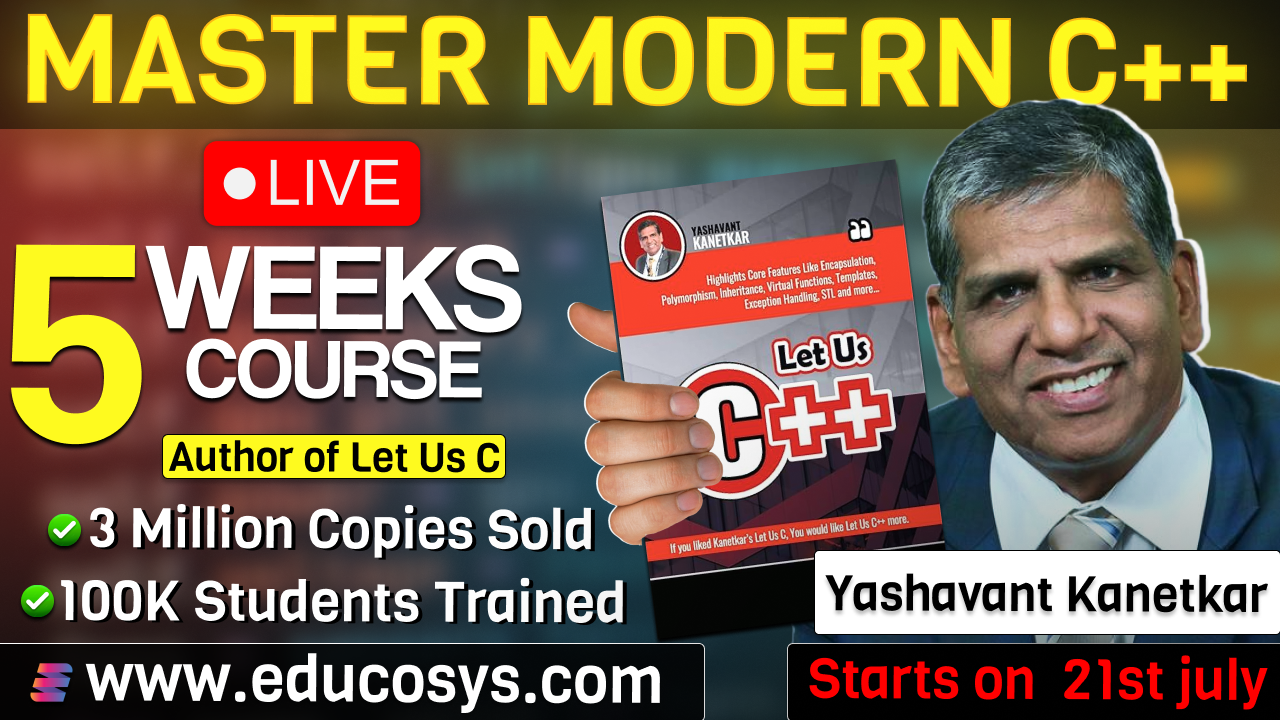Master Modern C++ with Yashavant Kanetkar

Description
Day-wise Curriculum
Day 1
Non-OO Features
-
Namespaces
-
Flexible Definitions
-
:: (Scope Resolution Operator)
-
References
-
Aloginof
-
Alignas
Day 2
Function Enhancements
-
Compile time execution
-
3 types of Function Calls
-
Returning address/reference
-
Inline Functions
-
Function Overloading
-
Lambda Functions
-
Recursion
Day 3
Object-Oriented Programming (OOP)
-
String Class
-
User-defined Class
-
Classes and Objects
-
std Namespace
-
Access Specifiers
-
Input/Output Operations
Day 4
Object Initialization
-
Function Copies
-
this Pointer
-
Public Data
-
Member Functions
-
Constructors
-
Overloaded Constructors
-
Need-based Constructors
-
Conflicting Constructors
-
Explicit Constructor Calls
-
Initializer Lists
Day 5
Advanced Class Features
-
Static Members
-
Operator Overloading
-
Friend Function
-
Friend Class
-
Class Organization
Day 6
Object Creation and Usage
-
Static and Dynamic Allocation
-
Memory Leaks
-
Dangling Pointers
-
Double Delete
-
Shallow Copy
-
Deep Copy
-
Manager Functions
-
Rule of 5
-
Move Semantics
-
Rule of 0
Day 7
Type Conversion
-
Type Conversion Overview
-
static_cast
-
dynamic_cast
-
reinterpret_cast
-
const_cast
-
Conversion between User-Defined Types
Day 8
Reuse Mechanisms
-
Templates
-
Containership
-
Inheritance
-
Object Sizes
-
Special Constructor Handling
-
Order of Initialization
-
Types of Inheritance
-
Diamond Problem and its Solution
Day 9
Polymorphism
-
Virtual Functions
-
VTable and VPtr
-
Early and Late Binding
-
Virtual Destructors
Day 10
IO and Exception Handling
-
Stream-based IO
-
Predefined Streams
-
Stream Redirection
-
Logging
-
Stream Manipulators
-
Character IO
-
Line IO
-
Record IO
-
Random Access IO
-
Exception Handling
-
Standard Exceptions
-
User-defined Exceptions
-
noexcept
Day 11
JSON and Database Access
-
JSON Writing
-
JSON Parsing
-
Data Organization
-
SQL Database Operations
-
Database Relationships Handling
Day 12
Templates Deep Dive
-
Function Templates
-
Class Templates
-
Variadic Templates
-
Non-Type Template Parameters (NNTP)
-
Default Values
-
Template Inheritance
-
Smart Pointers
-
Chrono Library
-
Time Calculations
Day 13
Standard Template Library (STL)
-
Containers
-
Adapters
-
Iterators
-
Algorithms
-
Priority Queues
-
Binary Heaps
-
Making the Right STL Choice
Day 14
Concurrency and Parallelism
-
Practical Examples of Concurrency
-
Multithreading
-
Synchronization
-
Mutex
-
Condition Variables
Day 15
Security in C++ Applications
-
ICAN Principles
-
OpenSSL
-
TLS 1.3
-
Computing Message Digests
-
Authentication
-
Certificates
-
Symmetric Encryption
-
Asymmetric Encryption
FAQs
Is this a LIVE or Recorded Course?
This is a LIVE course starting on 21st July. Recordings of the course will be available for 1 year after the LIVE classes end.
Who is the instructor of this course?
Mr. Yashavant Kanetkar, Author of the Best-selling book, Let us C is the instructor of the course. He has taught over 100K students and has over 30 years of relevant industry experience.
What are the prerequisites for the course?
Participants should be able to write basic C++ code, compile and run it.
Will the code be provided?
Yes!
Is this course for freshers or for experienced people?
This course is for anyone aiming to learn Modern C++. Years of experience doesn't matter.
How can I run the code on my setup?
You should have C++ setup in your system. Our recommendation is to use Visual Studio on Windows or Visual Studio Code on Mac/Linux.
How can I connect with fellow participants of the course?
You will be part of a discord community with different channels for networking, asking doubts and more.
Where can I ask you doubts?
The discord community will always be active!
Where are classes held?
All classes are held live on Zoom. Once the class ends, the unedited original recording is available.
What language will the course be taught in?
Everything will be taught in English.
What is the duration of classes?
Every class will be 1 hour long, from 8:30 PM to 9:30 PM, followed by additional doubt solving and extra support.
Do you have a mobile application?
We have a mobile application for both Android and iOS.
Can I watch the class recordings or go through notes offline?
You can download the recordings and notes on the mobile application and use them offline as per your convenience.
Do you provide certificate for the course?
The certificate of completion is available once the live classes are over.
Can I get invoices for reimbursement?
Yes, proper invoice with GSTIN is available as soon as you enroll for the course.
I have more questions, how can I reach out to you?
Drop us a mail at support@educosys.com.
Loading...